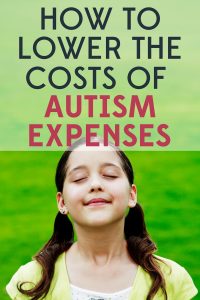Last week, the CDC reported that rate of autism in the US has risen yet again – now 1 in every 45 children is diagnosed with autism. While some may choose to chock this up to “changes in reporting,” there is no denying that autism is everywhere. As the mother of a son with autism, I will tell you first hand that it can be a very expensive disability, but if you want to see change in your child, you can’t afford to skimp on therapies, diet and other interventions you find helpful. The Autism Action Partnership states that “the lifetime cost to support an individual with autism is greater than $3.2 million.” Hopefully, we can help.
14 ways to lower the cost of autism expenses
Apply for Grants and Scholarships.
Over the years, I have applied for and received the following for my son: a brand-new iPad, a week of animation camp worth $500, a week of theater camp worth $425, a $500 scholarship for vision therapy and a $500 scholarship to see a highly-recommended autism doctor. Often, lower income families are often given first priority, but not always. It’s always worth applying.
ACT Today for Military Families Grant. Typical grants awarded range between $100 – $5,000. Incomes below $100,000 per year are reviewed first. There are also grants for civilian families.
Generation Rescue Family Grant. This grant provides financial support, products and services for auditory listening therapy, dietary intervention training, dietary supplements, two doctor visits, and lab testing.
TACA (Talk About Curing Autism) list of Autism Grants. Some are state-specific.
TACA list of Scholarships. These scholarships help families pay for physician-prescribed services and include stop gap medical treatments, independent assessments and other necessary crisis funding.
Dietary Interventions on a Budget.
Many children with autism benefit from a gluten-free/casein-free (and often soy-free) diet. But gluten-free foods, while more readily available than in the past, are still relatively pricey. Here are some great links:
- BB’s 10 Ways to Go Gluten-Free on a Budget.
- BB’s 11 Tips to Eat Gluten-Free on the Cheap.
- CFCFSF Diet on a Budget.
- GFCF Diet on a Budget: Meal Plans.
Tax Deductions.
Know what you can write off. For instance, were you aware that a percentage of the special foods you have to buy can be written off? Here are some Tax Strategies for Parents of Kids with Special Needs.
Other Ways to Cut Costs.
- Hire students. Many local colleges offer courses in special education. These students are looking for experience working with children with special needs. Most college and grad students have energy and enthusiasm and are genuinely invested in helping your child. While a therapist might cost $95 an hour or more, you can hire a student for babysitting wages while helping both your child and the student’s resume.
- Autism on Public Assistance. This is a great cost-cutting list.
- We Rock the Spectrum Kids Gym. These gyms have been popping up all over the country and for the price of a visit to a regular kids’ play gym, you get access to all kinds of high-quality therapy equipment which is terrific for follow-through between physical and occupational therapy sessions. An added bonus – all kids are welcome so your child will have an opportunity to play side-by-side with typically developing children for an added social component. Read my article with founder Dina Kimmel to learn more about the gym and its philosophy.
Your Biggest Resource: Other Parents
I have benefitted in so many ways by connecting with other parents of special needs children. From them, I have not only received emotional support, but we parents are always looking out for each other and telling each other about opportunities. Currently, my son is attending a social skills class that has been offered in the past for $1,400. When the class was suddenly offered for FREE, I signed up ASAP, all thanks to a parent notification. I bought an $800 therapy swing from another parent for $150. Other parents have referred me to free support groups and discounted or free classes and camps for children with autism. They have told me what therapies are worth the money – in their experience – and what ones are not. I’ve been emailed about sales on gluten-free items and vitamins and supplements, been told of autism get-togethers, screenings and workshops. Other parents are invaluable.
Resources vary from state-to-state, but there are many online groups as well. Here are some resources for networking with other parents:
My Autism Team. Social Network for Parents With Autism.
Talk About Curing Autism (TACA). Connect by email with other parents in your area through their email groups. Monthly meetings with a variety of speakers and topics.
How have you helped cut the cost of autism expenses?




Leave a Reply